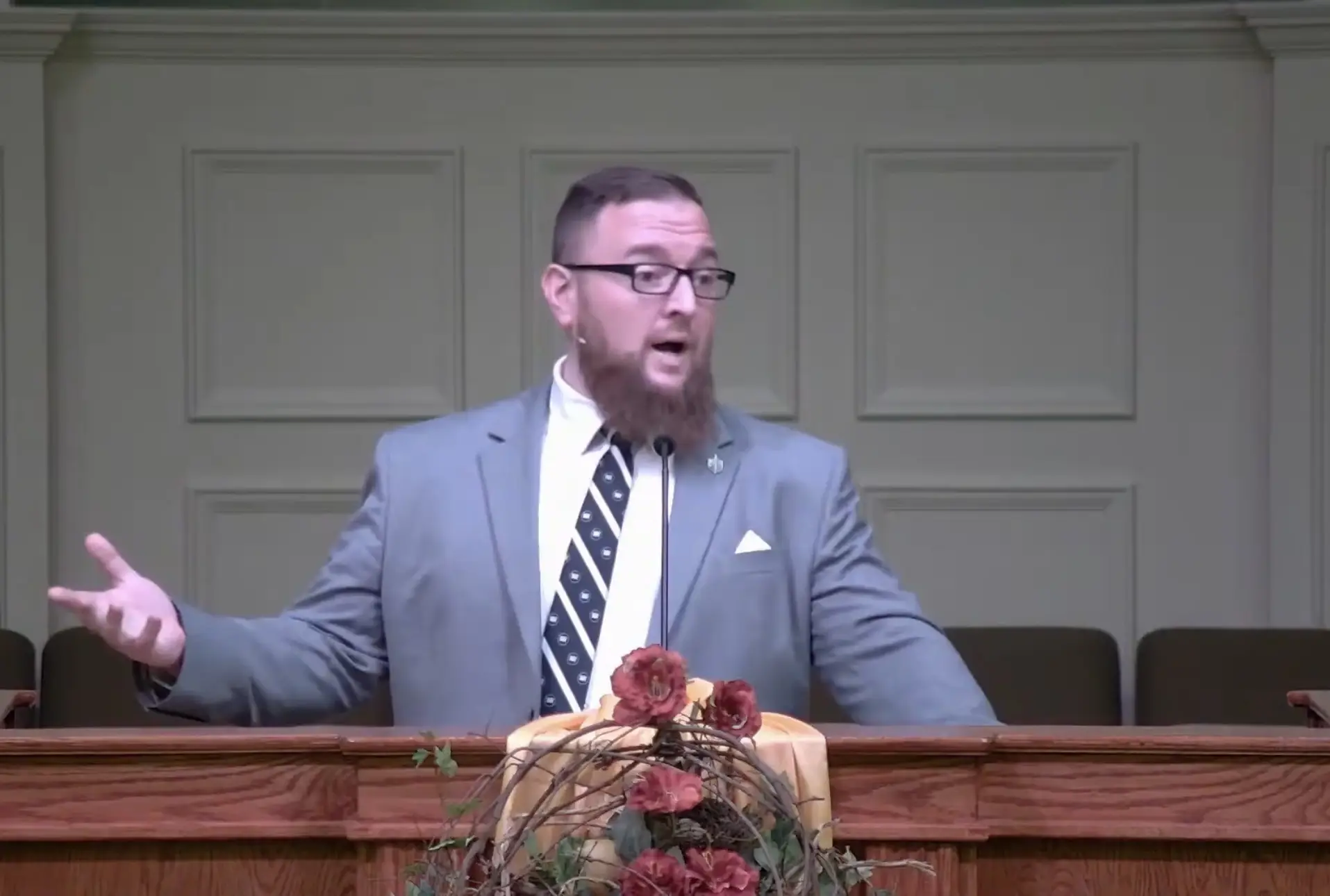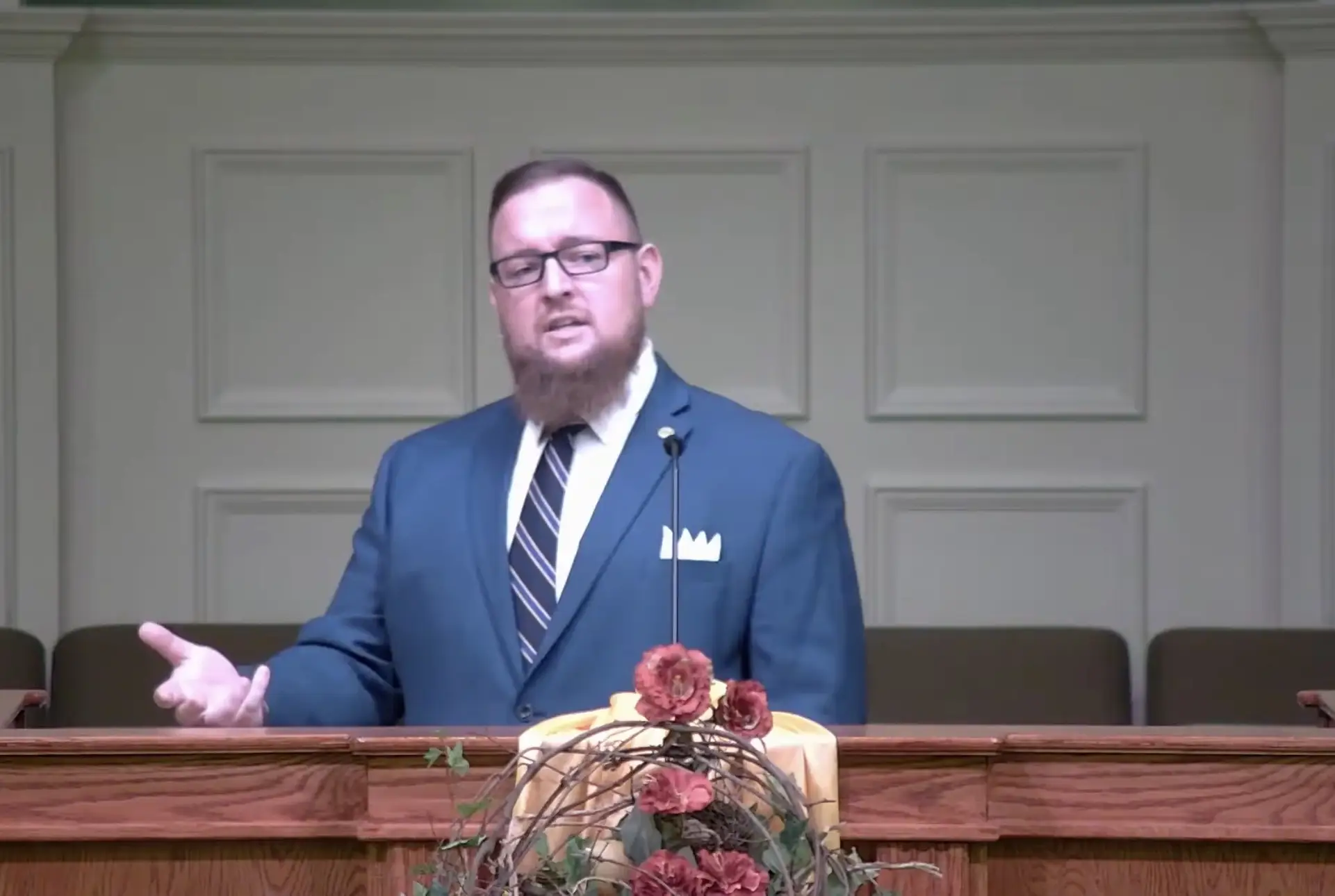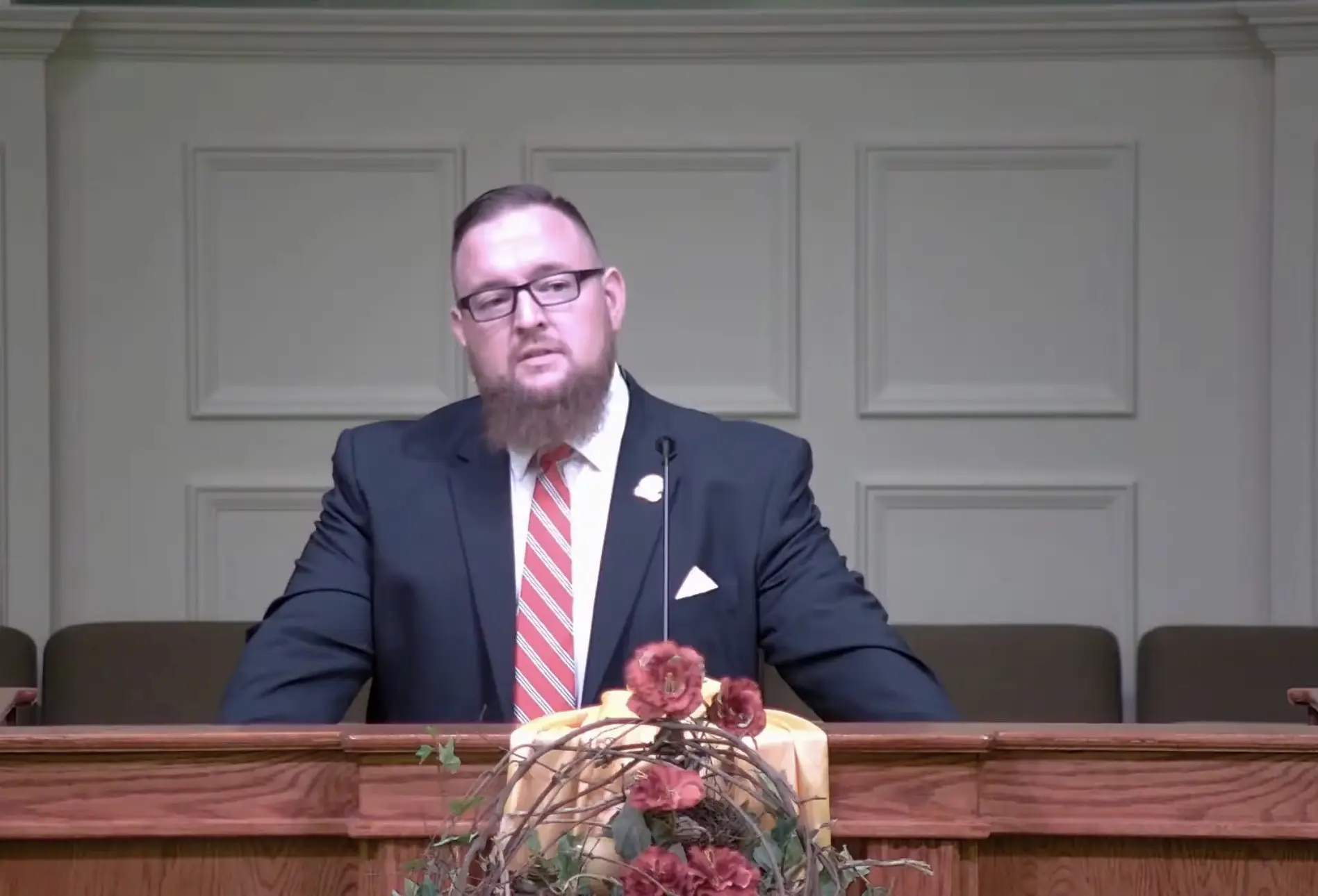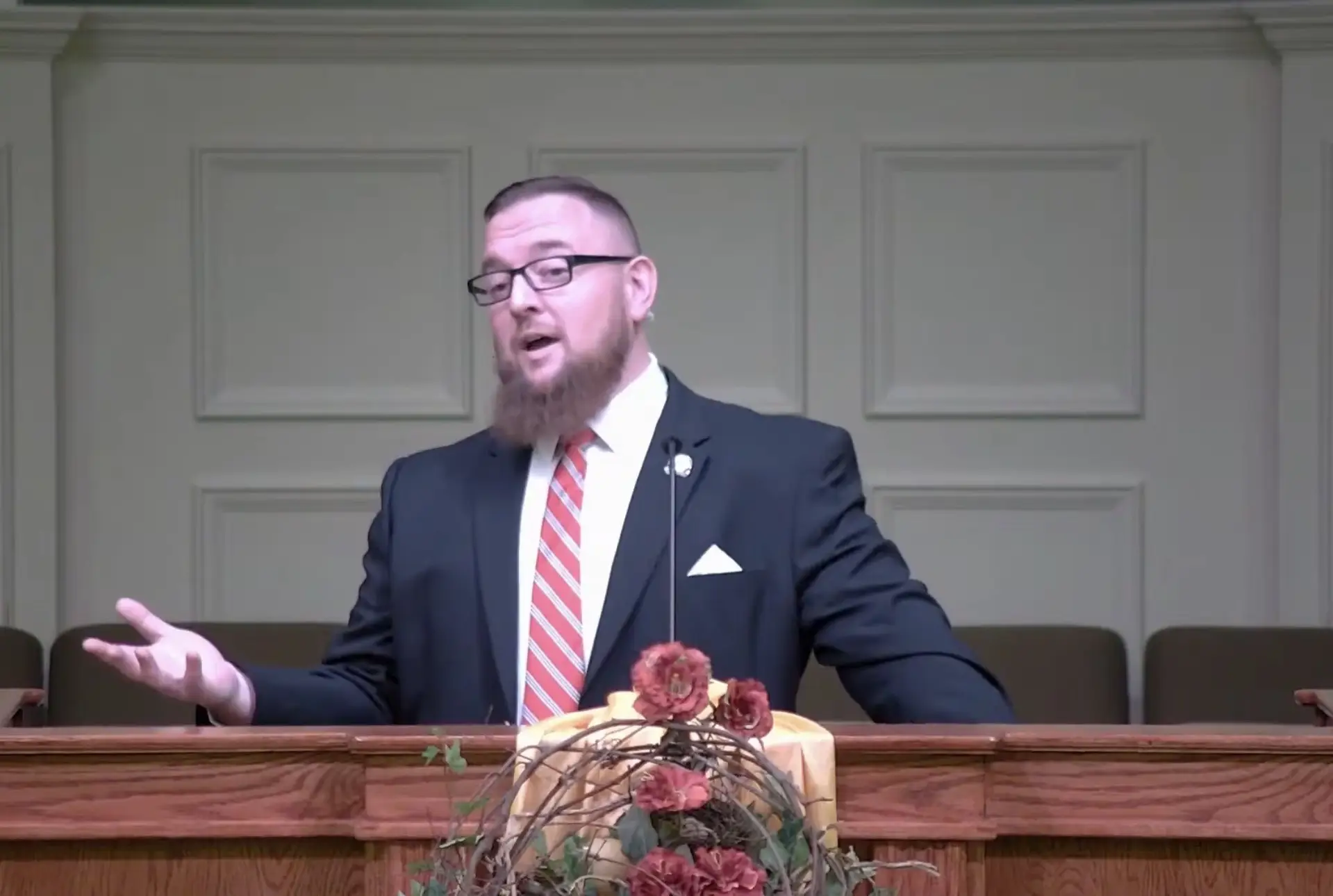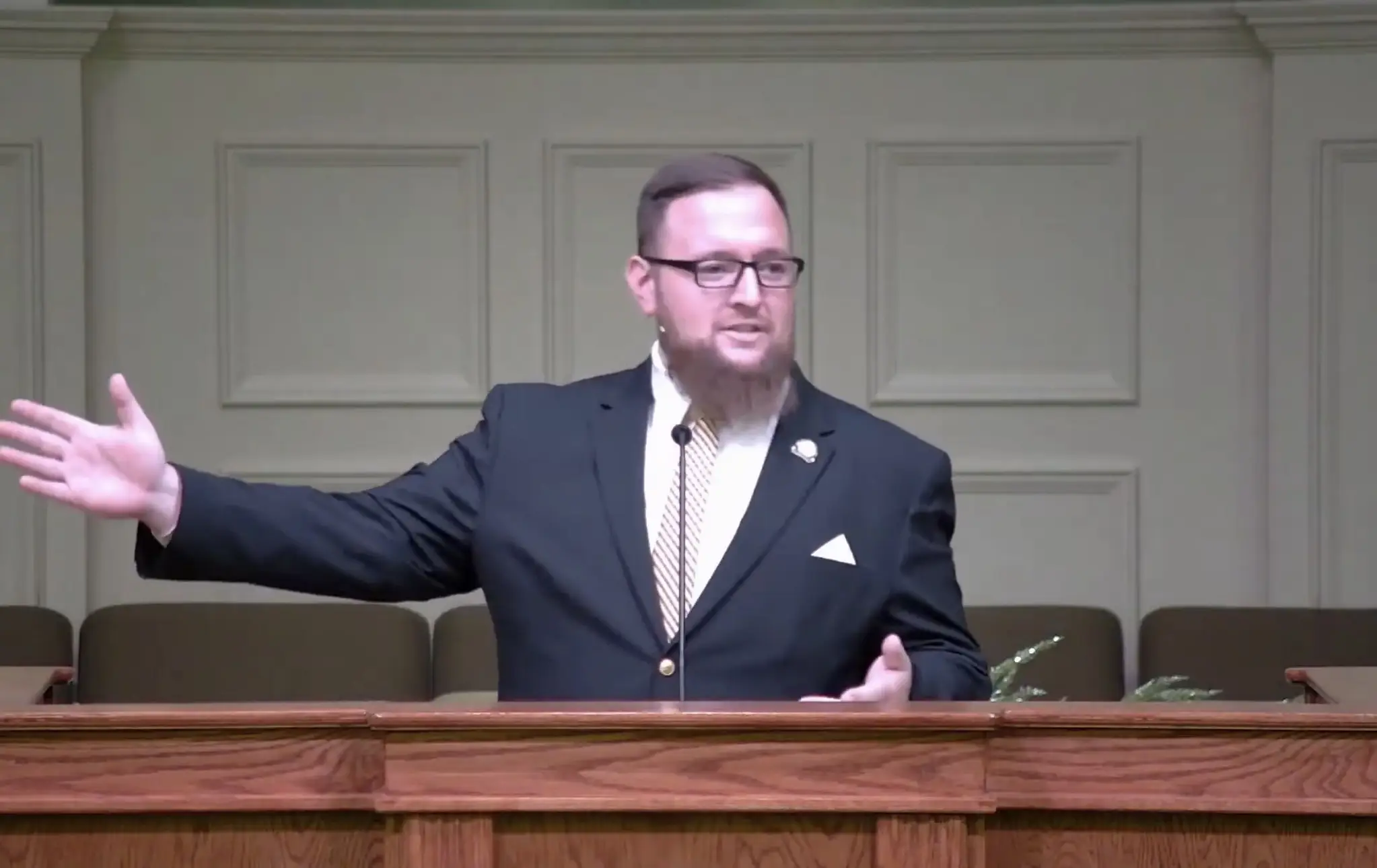Video
“To Marvel”
Psalm 8
Pastor R. Stephen Kretzer II
08/31/2025
Audio
Transcript
I want to ask you to go ahead and open up to Psalm 8. That’s where we’re going to be this evening. I do just want to thank Wayne for his leading of our music every week. He does a good job, and we do appreciate him, so thank you for that, Wayne.
Psalm 8 has, quite honestly, become probably my favorite psalm. It’s a shorter one, nine verses, but it is a truly beautiful one, and I have just really, really come to love it. So I’m going to be reading Psalm 8. The psalmist, which in this case is David, writes, as inspired by the Holy Spirit, O Yahweh, our Lord, how majestic is your name in all the earth. Who displays your splendor above the heavens. From the mouth of infants and nursing babies, you have established strength. Because of your adversaries, to make the enemy and the revengeful cease. When I see your heavens, the work of your fingers, the moon and the stars which you have established, what is man that you remember him, and the son of man that you care for him? Yet you have made him a little lower than the angels, and you crown him with your glory and majesty. You make him to rule over the works of your hands. You have put all things under his feet, all sheep and oxen, and also the animals of the field, the birds of the heavens, and the fish of the sea, whatever passes through the paths of the seas. Oh, Yahweh our Lord, how majestic is your name and all the earth.
Let’s pray. Heavenly Father, I pray that we honor you and glorify you tonight through the preaching of your word, that the Holy Spirit will speak and minister through me, and that we reflect upon how majestic you are and how majestic your name is. In Jesus’ name, amen.
My wife and I, Carrie, we really enjoy watching different sporting events, specifically Olympic sporting events. And one that we’ve been watching recently, we were watching a couple weeks ago, the USA Gymnastics Championships. And when you watch these gymnasts, just last year we had the Olympics. And the US gymnastics teams, specifically the women’s, for the past 10 to 15 years, we’re actually going back farther than that, have been the best in the world. So when you’re watching USA Gymnastics, you’re watching the best in the world. And when you’re watching them,
Michael’s giving me a signal, but I don’t know what he means. I’m not on. Am I on? There we go. All right. Okay. Thank you, Michael. And I’m very thankful for our sound team, too.
Back to gymnastics. When we watch gymnastics, and I think I can speak for probably everybody here. If I’m wrong, you can come talk to me afterwards. But I think it’s safe to say that none of us here are Olympic gymnastics. So when we watch these athletes, we marvel at them. We’re in amazement. I mean, when they do something like the pommel horse, or the high bars, or the parallel bars, or all these things they do, It’s incredible. They’re feats of great athleticism. And I just sit there and I marvel at them. And part of when you marvel at something, you’re marveling at something you can’t do or you can’t do nearly as well. Which in my case, I can’t do that at all. I can’t even touch my toes.
But I mean, it’s amazing what they can do. And when we think of that idea and that concept of marveling, we can do it in life when we’re watching feats of athleticism, or we’re watching somebody give an amazing speech, or perform a brilliant concert, or whatever it could be. But that concept of marveling doesn’t just stop there, but it goes into the Christian life as well. We are to marvel at God and His works. And when we come to Psalm 8, we see that this psalm shows us we are to marvel at God and what He has done.
And as we look at Psalm 8, we see that the whole psalm is bracketed by verse 1 and 9, and verse 1 and 9 say the same thing. O Yahweh our Lord, how majestic is your name in all the earth. And that’s how the psalm is bracketed. And it’s bracketed in that way to show that God is great and his greatness extends everywhere. So it’s setting it up, that’s how the psalm starts. Starts off with God, how majestic is your name in all the earth. And the first words are oh Yahweh, God’s divine holy name. And it ends that way, which shows us right from the start, hey, this psalm is about God. It’s about who he is and what he does. And that first few words, oh Yahweh, our Lord, should grab our attention. We know who it’s about. The focus is on God and what he has done.
And David, who wrote this psalm, can testify to the great things he has done. Obviously, our mind can go to David and Goliath, but there’s many more things throughout the life of David where he can reflect on and think how great God has been. throughout his life. This is a psalm of praise. There’s different psalms, psalms of thanksgiving, psalms of lament, but this is definitely one that would be a psalm of praise. And as we move on throughout the psalm, we see who displays your splendor above the heavens. And we see this psalm, all of creation testifies to how majestic creation is. And the idea of majestic and majesty deals with beauty and even power.
So we see the majestic, the majesty of God. In verse one, how majestic is your name in all the earth? How powerful is your name? How beautiful is your name? How great is your name? That word is being used intentionally. And creation speaks to the majesty of God. Last summer, summer of 2024, Carrie and I had the opportunity to go to Switzerland with my family. And I mean, just, Switzerland is an absolutely beautiful country. We went to some truly beautiful places where everywhere you look, you’re surrounded by these snow-capped mountains. And you take these beautiful hikes, and it’s breathtaking to see the lush green fields as they slope the mountaintops. And I mean, it just screams the majesty and the majestic nature of God. You can’t walk away thinking this is an accident.
And some people do, obviously. Some people say it’s a, this all got here by a process of evolution and a big bang. But they are denying the clear and undeniable works of God, the majesty of creation. God’s creative majesty and splendor extends to the farthest corners of the earth, but also the farthest corners of the universe. He created every aspect of the universe, every star, every nebula, whatever it is out there, he created it. And his majesty extends to those farthest corners that man has not even touched yet, even with satellites. His majesty is everywhere, everything he’s created, everything, all of who he is is majestic. And in verse two, we see that David shifts to focusing more on what he has done. Verse one focuses on who he is, but in verse two, we move into what he’s done, which is an important aspect to think about when you’re talking about what someone does, specifically God, what he does. You oftentimes have to start with who he is.
And in verse two, from the mouths of infants and nursing babies, you have established strength because of your adversaries to make the enemy and the revengeful cease. God can use weak humans to accomplish his will. And David, like I just said, was somebody who knew this well. The old story of David and Goliath, you had small David against the mighty warrior Goliath. And God used David. God used David throughout all his life. One commentator talking about verse two said this. The idea here is that God has ordained that the weakest shall confound the strong. Mankind, even weak children and infants, represents the strength of God in the earth. God can use anybody, no matter how great or small, for his glory. No matter how old you are, how young you are, where you are in life, where you live, what your job is, what your socioeconomic status is, God can use you and will use you. In fact, oftentimes the weaker and smaller the person is, the greater the glory God gets. I mean, he saves wretched, wicked people and he then uses them.
This is how it is even with us. It’s a blessing and we should be thankful that God chooses to use us. And David, like I said, is someone who can testify to that. He knew what it was like to be weak and to be used by God. And as we move into verses three and four, we see that God, the Psalm shifts to talking about God’s creative power, but his creative power in relation to man. Verses three and four, when I see your heavens, the work of your fingers, the moon and the stars which you have established. So David is looking at the heavens, he’s looking at creation. The moon and the stars which you have established. What is man that you remember him and the son of man that you care for him? So he starts with creation. He’s talking about the majesty and beauty of creation. I talked about those mountains of Switzerland. He’s looking at the creation around him and he’s amazed by it. He’s in awe of it.
And then as he’s in awe of creation, as he’s marveling at creation, he thinks to himself, why would God, who created all of this, who made everything in its detail, care for me? Care about us? Why on earth would God choose to care for us? Why would he choose to love us? When I read this verse, I think, who are we, who am I? that God would choose to even create me, would choose to care for me, would choose to save me. Verse four, what is man that you remember him and the son of man that you care for him? This is what I love about this psalm. Who are we? It’s humbling. We see a posture of humility here from David. It’s a posture we should all have, and these are all important, and this is something we need to remember that will keep us humble. Who are we that God would care for us? Because we’re not good. I chose the word marvel for my main point because when we marvel at something, we are not focused on ourselves.
So my main point, we are to marvel at God and what he has done for us. If we’re marveling at something, we should not be focused on ourselves. When I’m marveling at what these athletes can do, I’m focused, I’m amazed at what they can do and not what I can do. So when we’re marveling at God, we’re focused on Him. Our hearts are turned towards Him. Our attention is drawn from us and to something else. But there’s a flip side of that too. So we’re marveling at something, we’re focused on what we’re marveling at. So as Christians, we’re to marvel at God, but as we’re marveling, we are also reminded, who am I? Why would God care for me? I am weak. I stumble and fall. God does not, and I need him. This marveling at God should cause us to love him more and recognize our need for him more and more.
This marveling keeps us humble, which I think is a key part of this psalm, and when I read the language of verse four, it brings to mind for me Romans 9, 19 through 20, which is one of my favorite chapters in the Bible, but in Romans 9, verses 19 through 20, Paul writes this. You will say to me then, why does he still find fault? For who resists his will? On the contrary, who are you, O man, who answers back to God? Will the thing molded say to the molder, why did you make me like this? This is the famous chapter where we read of God’s sovereign choice in salvation. Earlier in chapter 9 we read that God says, Jacob have I loved and Esau I hated and in verses 19 through 20 Paul is explaining God’s sovereign choice in salvation that he chooses whom he wishes to choose to be saved and that we can’t always understand it It’s his sovereign choice and that is what it’s beautiful because he chooses to save some and that in itself is a gift.
But in verses 19 through 20 Paul is answering those who say, how can God still find fault with us if he makes a choice? For who can resist his will? But how does Paul respond? On the contrary, who are you, O man who answers back to God? Will the thing molded say to the molder, why did you make me like this? God saves whom he wishes to save and it is not our place to question him or find fault with him. Remember, who are we that God cares for us? And if that’s the case, then who are we to question whom He saves or whom He does not save? Now it is natural sometimes, we need to go to God and say, God, please save this someone. And sometimes it’s a natural heart posture to be like, why isn’t this person saved? That can be a natural question we ask. But we always need to be reminded of this passage in Romans 9, of God’s sovereign choice and who are we?
Who are we, the ones that are molded, the clay? God is the one who forms us. Who are we to question God? The creature, this is one thing I’ve been emphasizing, or I’ve been trying to emphasize with our youth group, is that we are the creatures and God is the creator. And the creature has no right to accuse the creator. We cannot tell the creator what to do. We cannot tell the creator how to live or how we are to live. And especially in this case when the creator is Yahweh, is God. He knows what is best for us. Who are we that God would create us and save us? This is a question we should reflect upon each and every day. Who are we that God would create and save us? And not only did God choose to create us, but he created us in his image.
And in verses five through eight, it reminds us of Genesis chapter one, 26 through 31, when God makes man and tells him to subdue and have dominion over the earth. Just this past week, in youth group, I took a lesson to talk about what it means to be created in the image of God. Talked about what it means to be human. And we focused the whole lesson on being made in the image of God. And when we read five through eight, we see it echoes back to Genesis chapter one, where we read that man is created in the image of God. And because of the fact that we’re created in the image of God, we’re representatives of God on earth. We have responsibilities and duties that God gives us. And in verse five, yet you have made him a little lower than the angels, and you crown him with glory and majesty. And being made lower than the angels probably refers to the fact that we are not in the heavens where they are, and we don’t have some of the same roles as they do. But the emphasis in this verse is still on the greatness of our creation. Angels are heavenly beings. We are not heavenly beings. One day when we die, we will be, but right now we’re not. So God chose us to make us just a little lower than those that dwell in the heavens.
Now, in verse five, there’s an important translation note to make. It says, I’m reading out of the LSB, and it says, you have made them a little lower than the angels. Several translations, I think the NASV 95 and the ESV will translate that word as God. So instead of saying angels, it’ll say a little lower than God. There’s debate on the translation of it. The actual Hebrew word that’s used in this passage is Elohim, which is sometimes a name for God. But at other times in the Old Testament, it also would have been used for gods, or it could be used for things other than just God, as in Yahweh. And I think the LSB and translations that translate it as angels probably translate it most accurately. And part of the reason for that is in a minute we’re going to go to Hebrews 2. And Hebrews 2 actually quotes this psalm. And that helps us understand the passage a bit more. But before we get to Hebrews 2, the last part of verse 5, and you crown him, you crown man with glory and majesty. Human beings are the crowning jewel of God’s creation. God created many wonderful things. He created the mountains. He created fields. He created beautiful fields of flowers. He created beautiful animals, majestic animals. But we are the crowning jewel of creation. And we’re the crowning jewel because we’re made in his image. And because of that, we’re to rule the earth.
And one of the reasons I wanted to take a lesson in youth group to talk about the importance that humans are made in the image of God is because in our world today, that is so foreign to a godless and pagan mindset. Because in the world we live in, and honestly, it’s since Adam and Eve fell, the push is to forsake God and everything. But especially in our secular age, in an age dominated by evolutionary thought, in an age even today dominated by the fact that you can change your gender, the idea of being created in the image of God is lost on so many people. They don’t know it or they refuse to believe it. When you take away that we’re created in the image of God, you end up coming down to just that we’re accidents, that we have no purpose.
There’s a famous moral philosopher named Peter Singer, who in 1975 wrote a well-known book where he essentially advocated for the equality between animals and humans. And he’s been a big advocate for the equality of animals throughout his entire career. And he would say that we essentially should, animals and humans are not equal in every respect, but in most things they are. But he also believes that there’s certain humans that don’t necessarily deserve to live. This is what he says in an article he wrote. He talks about how infants and those with disabilities lack rationality, autonomy, and self-consciousness. And that’s how he essentially will define humans. Rationality, autonomy, and self-consciousness. You’re a functioning member of society if you have those three main qualities. And if you don’t, You’re not a functioning member of society. You are not a benefit to a society. This is part of what goes into utilitarianism, which is what he holds to. Utilitarianism basically says, what’s the best thing for society? What’s the benefit for the society? But what ends up happening in that philosophy is it’s what you think is the best thing for society, and that’s what he’s saying.
So he says that people who are mentally handicapped, if they don’t possess these three qualities, it’s okay if they die. Infants don’t have the same value as an adult does. He’s basically advocating that killing is okay. He not only advocates for euthanasia, he advocates for non-voluntary euthanasia. He says the person doesn’t have to consent when we kill them. He justifies murdering. And this is where you get when you leave being created in the image of God. Human life has no value, or whatever value you think it has is what you prescribe to it. Rationality, autonomy, and self-consciousness. And notice that one of those three qualities he puts is autonomy, the ability to do what you want, to make your own decisions. This is where you get when you forsake the important doctrine of being created in the image of God. Infants have no value. People with mental disabilities have no value. They’re not a benefit to society. But yeah, what’s interesting about people like Peter Singer is they say, well, you can abort, we don’t even have to worry about it. People with disabilities, they can be killed, it’s no big deal. But he’ll fight tooth and nail for animals. And animals are important. We should love animals. But they are not created in the image of God. And we are.
And being created in the image of God means we’re greater than the rest of creation. And that’s not something to puff ourselves up with. That’s something we need to recognize because being created, God put us above creation, the rest of creation. And that means we rule over it. We’re to subdue and have dominion over it. That’s part of the creation mandate. We are God’s representatives on earth. We’ve been given the responsibility to care for and govern creation. Verse six, you make him to rule over the works of your hands. You have put all things under his feet, all sheep and oxen, and also the animals of the field, the birds of the heavens, and the fish of the sea, whatever passes through the paths of the seas. It’s man’s job to care for this world.
Michael Kruger, a theologian, says this, God made human beings to be the guardians, protectors, and rulers of this world. And that’s true, and that’s how it is to this day. We should care for the earth. Now, I’m not going to go into some 30-minute monologue about climate change, mainly because I really don’t understand it that well, but we should care for the earth. We should not just leave our trash out on our yards. We should not throw stuff out in the oceans. Throw our trash out in the oceans. And like I said, that’s not me trying to be the climate change police. That’s me saying we should care for creation. We should care for animals. We should protect animals that need to be protected. But that doesn’t mean we let them overrun our neighborhoods or the areas we live in. This is a responsibility we have and we should take it seriously.
And we also need to, as we talk about the psalm and understanding, or creating the image of God, and especially verses three through eight, as we read there and see that as part of the original command that God gave to man, that Psalm eight is also a messianic psalm. And I ask that you go ahead and turn to Hebrews chapter two, looking at verses five through nine, the author of Hebrews, And 5-9 references Psalm 8. Well, he does more than references it. He applies Psalm 8 to Jesus Christ.
And in Hebrews 2, verses 5-9, we read, starting in verse 5, for he did not, and he’s talking about Jesus here. In verse 5, the author is talking about Jesus. He’s talking about God and Jesus. For he did not subject to angels, so God did not subject to angels the world to come concerning which we are speaking. But one has testified somewhere saying, what is man that you remember him or the son of man that you are concerned about him? You have made him for a little while lower than the angels. You have crowned him with glory and honor and you have appointed him over the works of your hands. You have put all things in subjection under his feet. For in subjecting all things to him, he left nothing that is not subject to him. But now we do not yet see all things subjected to him, but we do see him who was made for a little while lower than the angels, Jesus, because of the suffering of death, crowned with glory and honor, so that by the grace of God he might taste death for everyone.
So we’re seeing in those few verses what God gave to his son, Jesus. And this passage, like I said earlier, also helps us understand Psalm 8 and that particular word in Psalm 8 should probably be translated angels. Verse nine of Hebrews 2, but we do see him who was made for a little while lower than the angels, Jesus. So it seems the indication in Psalm and here is that humans were made a little lower than the angels and Jesus was made when he came to earth in his human form, not in his divine form, but in his human nature, a little lower than angels. It’s also important to think about when you think of Psalm 8, if the translation was a little lower than God, and then that’s a messianic song, that’s a messianic song that’s applied to Jesus, is a little confusing if you think of that in the sense of Jesus was made a little lower than God. So angels does seem the most accurate translation. But we’re also reminded here when we read about Christ and how he’s made lower and everything that was put in subject to him, we’re reminded here that he is, the perfect image of God, which is what Hebrews 1, verse 3 says.
Hebrews 1, verse 3 says this about Jesus. Jesus obeyed the law perfectly. He actively obeyed the law perfectly. He’s the exact representation of his Father. We’re creating the image of God, but because of Adam and Eve’s sin, it’s an imperfect image in a way. We’re not as perfect, we’re not perfect, but Christ is that perfect image. And he is the king over all and rules perfectly. Everything has been put in subject to him. We are to rule over the earth and have dominion over it, but Christ rules over us, he rules over all. And Christ was crowned with glory and honor because of what he did for sinners, because of going to the cross for sinners. We are crowned with glory and honor as we remain in the image of God, but Christ was crowned with more glory and honor because of what he did on the cross. He died on the cross for miserable sinners so they could spend eternity with him and his father in the new heavens and new earth.
And that’s something that Hebrews dives into a lot about. And our response when we think of Christ and His atoning work, His work of saving sinners from their sin, should be, who am I? Who am I that He would do this for me? Because I don’t deserve it. Christ’s work on the cross should humble us when we think about it. When we think about our salvation, it should never be of, God save me, I must be doing pretty good, I got saved. No, it should be why, who am I that God would save me? Because we cannot save ourselves and we do not deserve it. Christ takes weak, filthy people and he washes them clean. And then he uses them for his glory and honor. And we are to marvel at God and what he has done, we are to marvel at what his son has done. I marveled at the feats of athleticism that these athletes do. I marvel at what I cannot do. But this pales in comparison to who God is and what He has done. We are to marvel at God and what He has done for us, and we should marvel at His Son and what He has done for us. We’re going to close in just a minute.
We’re going to close with actually singing, Behold Our God. But I wanted to read four lines from verse two of that song, because I think they can apply to what we’ve been talking about here, and just this idea of who are we that God would care for us, that God would save us. And verse two of Behold Our God says this. Who has given counsel to the Lord? Who can question any of his words? Who can teach the one who knows all things? Who can fathom all his wondrous deeds? We can’t teach God, we can’t fathom what He does, but we can and should be thankful for Him and marvel at Him.
Let’s pray. Heavenly Father, I thank You for this evening, and I pray that we marvel at You every day of our life, that we’re focused on You and not ourselves. And I pray that You bless the rest of this service this evening, in Jesus’ name, amen.

